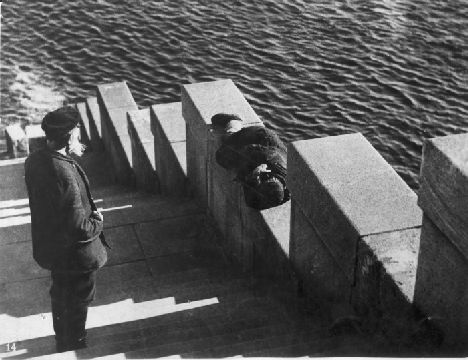The End of St. Petersburg (1927) 

Director: Vsevolod Pudovkin, Mikhail Doller
Cast: Aleksandr Chistyakov, Vera Baranovskaya, Ivan Chuvelyov
Synopsis: A peasant coming to St. Petersburg to find work unwittingly helps in the arrest of an old village friend who is now a labor leader.
Even if the title didn’t give it away, it would be impossible to mistake The End of St. Petersburg for anything other than a Soviet propaganda movie from looking at the list of characters. We have The Bald Revolutionary, Communist Working Man, The Village Lad and The Peasant Boy amongst others, although there are very few named characters which I suppose is in keeping with the Communist preference for the collective over the individual.
The movie, directed by the legendary Vselevod Pudovkin, was made to celebrate the 10th anniversary of the 1917 revolution, so you know what that means. Sure enough, we get the usual raggedy peasant women trudging around their ramshackle village with shoulders slumped and heads bowed, or their ruddy-faced menfolk sitting down in the fields to eat dirt sandwiches. These images are contrasted with the feeding frenzy of fat, old and greedy stock market traders milling around in their bowler hats and yelling excitedly as they gaze at one another through their pince-nez’.
Personal emotions have no place in Soviet celebrations of the past – unless, that is, you count patriotic fervour as an emotion, and so it’s difficult to get swept up in the heat of the moment, especially as The End of St. Petersburg focuses more on the build up to revolution rather than the act itself. Pudovkin films the peasants from low angles and has them pose heroically, their jaws set, their gazes fixed on some better future in in the middle-distance in which the proletariat produces bread instead of cannon shells. He had an undeniable talent, did Pudovkin, and like his compatriots, he knew a thing or two about editing film in a way that skilfully evokes the heat of battle, the fervour of an uprising and the excitement of revolution.
Russia withdrew from the war once the revolution took hold, and The End of St. Petersburg’s most powerful moments take place in the waterlogged trenches in which soldiers near death complain that they’ve fought for three years without knowing why. Shots of the soldier’s misery are contrasted – once again – with those fat-cat traders profiteering from the war which is killing their young men. The message is powerfully conveyed and unmistakeable, but it’s delivered in too strident a fashion for modern tastes. Burdened with symbolism that lacks subtlety – how many times do we need to see dramatic, darkening skies to realise something momentous is building? — the movie preaches too much to its once-captive audience. And yet, when viewed as an example of Pudovkin’s technical ability and vision, The End of St Petersburg is frequently breathtaking.
(Reviewed 4th February 2014)
httpv://www.youtube.com/watch?v=1g0inkGacgo
